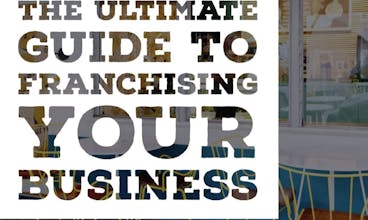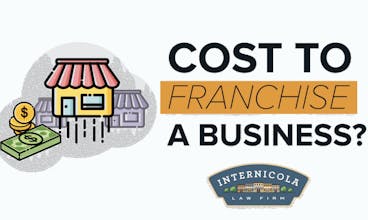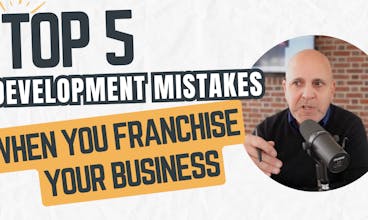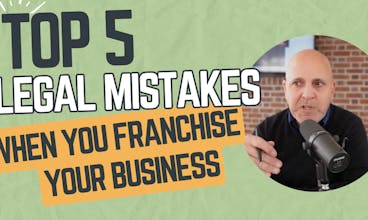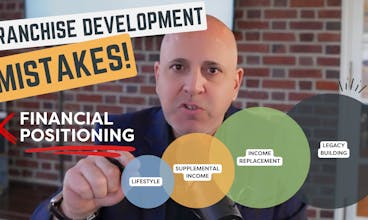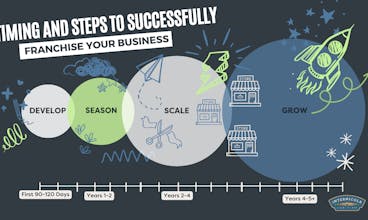Whether you’re a seasoned business owner with diverse industry experience or an entrepreneur looking for ways to grow your first venture, franchising can be an attractive option for anyone looking to scale a business.
While franchising might seem like the natural next step for any established business owner, though, it isn’t always right for everyone. In franchising, timing is everything. After determining that your business is franchisable, prospective franchisors should make sure the time is right to franchise their business. As a prospective franchisor, you can utilize a three-part framework to evaluate your company’s performance track record, the industry you operate in, and what your goals as a founder are.
Below, we’ll explore these points in detail to help you decide whether now is a good time to franchise your business – or if it might be wiser to position yourself for success before making the leap into franchising.
1. Your Business’ Track Record
As a business owner, one of the most important things you can do before deciding whether to franchise is to evaluate the performance of your business right now.
“When someone buys a franchise they are making an investment in their future. They want to build a business that will improve their lives financially. When we evaluate a business’s franchise readiness, profitability and potential ROI are key metrics that we focus on,” says Charles N. Internicola, an attorney with over 25 years of experience in franchising and the founder of The Internicola Law Firm, P.C.
How long has your business been open?
As a general rule, it’s recommended that businesses have at least one to three years of successful operations before franchising. That number could be higher or lower, however, depending on the industry.
For some businesses, franchising during the first two years of operations can be advantageous. This is rare, however, and should be done carefully under specific circumstances – for example, in industries with lower costs or where very new market segments are experiencing hyper-growth.
Do you have good systems in place?
As part of the franchising process, new franchisors will spend time developing an operations manual for their franchise. One of the five cornerstone documents of every franchise system, this confidential internal guide will be provided to every new franchisee and serve as the blueprint for consistent day-to-day operations at each franchised location across the franchise network.
Because proven systems are critical to the success of a franchise, business owners should have strong systems in place before starting a franchise. If your business doesn’t currently have effective and legitimate systems in place to guide its daily operations, it might be a good idea to establish them before initiating the franchising process.
Does your business have strong unit-level economics?
If you’re considering franchising, some positive signs are that your sales are growing, there’s good profitability, and people may be asking if they can buy a franchise from you. When you have prospective franchisees, they’re going to ask you how much money they can make, how much money your corporate locations make, and what they can expect from earnings. In the franchise world, the only way you can disclose this information is through your FDD Item 19 Financial Performance Representations.
Of course, when franchisees first open their doors, they aren’t going to be as profitable as you right away and they are also going to incur additional costs such as a franchise fee and ongoing royalty payments. So, when considering your track record, ask yourself how are your unit-level economics now and will your franchisees be profitable even if they operate at lower sales and higher expenses.
Have you differentiated your brand from competitors?
It should go without saying that outperforming the competition is a major goal for most businesses. Before franchising, business owners should consider whether or not they’ve adequately differentiated their brand from the competition to achieve this goal as a franchise.
Do you operate in a new industry?
There are always exceptions to the rules. We would rarely recommend business owners with less than a one- or two-year track record to franchise. However, there are instances where people have successfully franchised their business and grown their system in new industries where it was important to take that first-mover advantage.
2. Industry
If you’re in an industry that’s very competitive, understanding your business’s position within your industry is critical to determining the right time to franchise. By reviewing your capital requirements, the expertise of your team members, and your business’s ability to meet industry benchmarks, you can evaluate whether your business is properly positioned to franchise.
Are you well capitalized?
Although franchising can help reduce some of the financial burdens associated with growing a business over time, the process still requires capital to get started. The typical costs associated with franchising a business include fees for FDD legal development, operations manual development, financial statement preparation, filing and registration, franchise development, marketing costs and other sales-related expenses.
Because the estimated cost of franchising a business ranges from $18,500 to $84,500, it’s important to make sure you have enough capital to cover the startup and development expenses of franchising before starting the process.
“If you are franchising your business in a competitive industry and category where, once you enter the franchise world, you will be competing against entrenched competitors, you'll need more capital then entering the franchise space in a new category, product segment or service,” Internicola advises. “FDD and franchise development, when done correctly, can range from $25,000 to $75,000. After that, you should have a budget of at least $50,000, from a franchise brand basics perspective, to develop your franchise brand foundation including your franchise sales website with a compelling why you / why now, a video telling your brand story, process and presentations to educate, inform, and qualify franchisee candidates.”
Internicola cautions that there are also additional costs beyond startup costs that new franchisors should be aware of.
“After that, your budget will depend on your franchise sales goals. The higher your goals the more capital you'll need,” Internicola says. “I am a big advocate of focusing on organic franchise sales. In years one and two new franchisors should be focused on franchise sales through the organic reach of their brand. Once you’ve onboarded your first five to 10 franchisees, the future of your franchise system will depend on how well you support your franchisees, and the unit-level economics they achieve.”
Beyond capital, though, Internicola stresses that an investment of time is also critical to the success of any new franchise.
“When building your franchise budget, a lot will also depend on how involved you are in the process, learning franchising, and leveraging your own marketing and development tactics post-launch. We've seen small start-up brands with limited budgets, in time, grow tremendously,” Internicola says. “We've also seen well-financed brands fail. Internal team and strategy are critical to franchise success and the budget that you'll need.”
Are you working with the right team?
A good team can make or break any business, and working with the right people is critical for success in the franchising world. As a franchisor, your corporate team will be responsible for assisting you with franchise sales, franchisee training, daily operations and more.
When determining whether your business is ready to franchise, take time to think about your team members and their qualifications, level of expertise, business acumen, commitment to supporting employees of the business, and their experience in the industry.
If you have a top-tier team that’s committed to the growth and success of your business, it could be the right time to think about franchising. If not, it might be time to start bringing qualified team members on board to help you prepare for franchising in the future.
Are your numbers consistent with industry benchmarks?
In addition to performing well against the competition, you’ll want to make sure your business is meeting industry standards before franchising. To do this, compare your business’ position with other similar businesses in your industry.
If your business is performing well compared to its competition, its numbers are consistent with industry benchmarks, and it exhibits a strong track record of success, it might be a good time to franchise.
3. Founder Goals
If you have a successful business and want to leverage the franchise model to grow into a multi-unit development and expand the reach of your brand, you may be ready to franchise.
For anyone considering franchising their business, it’s important to understand that building a successful franchise system takes time – in most cases, years. Because franchising is a scalable process, your growth strategy should be based on a five-year strategy for success. One of the key indicators that it’s the right time to franchise your business is knowing whether or not you’re ready to commit to its growth over time.
“Once you've franchised your business, the biggest mistake you need to look out for is not focusing on the long-term wins. To succeed at franchising you need to have a one-, two-, three-, and five-year strategy. Years one and two are building years, and years three to five are acceleration and growth years. Too many startup franchisors get discouraged during years one and two, and it's because they didn't have the right expectations and game plan,” Internicola says.
Keep in mind that you’ll be transitioning from business operator to founder of a franchise organization. You’ll also be building a leadership team and training franchisees. Watch the video below to learn more about how to align your goals.
The good thing about franchising is that it’s scalable. You should be focusing on a Five-Year Growth Strategy. Keep in mind that you’re not going to franchise in year one and get 100 franchisees right away. It’s a slow buildup. So, this may be a good time to start since you need at least five years to ramp up sales.
“Begin with the end in mind. Franchise success is about building an organization that is achieving unit-level growth and for you, as a franchisor, building an organization that, five or 10 years from now, will be valued based on the cash flow that you earn from ongoing royalties paid by franchisees. Your franchisees are critical, and in years one and two, start off slow – focus on organic growth and understand that the success or failure of your first five, 10 and 20 franchisees will determine the success or failure of your franchise system,” Internicola says.
Not ready to franchise yet? Take the next year or two to position your brand so when you do decide the time is right, you’ll have an advantage. Final tip, register and protect your trademarks with the USPTO! Sometimes if you wait too long, you may have to rebrand and you won’t want to wait until you begin the franchising process.
Timing is Everything
“Timing mistakes include (franchising) too early, too late, and the wrong planning and time horizon after you franchise. Franchising needs to align with your long-term goals and mindset of building an organization that, in time, grows from your current operations, whether one, two, or ten locations, to an organization that sells franchises, supports franchisees, and is an entirely new business,” Internicola says.
When business owners decide to franchise too early, it can lead to a failure of the franchise to thrive properly, including the potential for moral and legal issues for franchisors.
“Franchising your business too early means that your business is not ready yet. This may mean that you don’t have the right systems in place, that your unit-level economics are not profitable enough, or that you and your internal team are not yet ready to make franchising your primary goal,” Internicola explains.
On the other hand, Internicola cautions that business owners considering franchising also shouldn’t wait forever.
“Franchising too late usually relates to a mindset where you believe that you need to have everything perfect when, in reality and in franchising, nothing is ever perfect and good franchisors and franchise systems evolve and improve over time,” Internicola says.
Learn More
To learn more about franchising your business, the documents involved and how we can help. Contact us at (718) 979-8688, live chat, or contact us.
